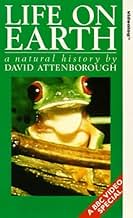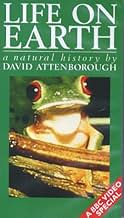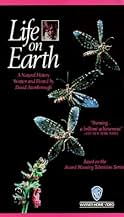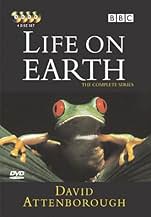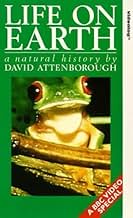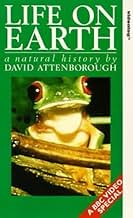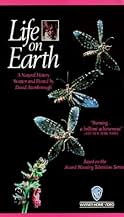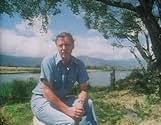VALUTAZIONE IMDb
9,1/10
3362
LA TUA VALUTAZIONE
Aggiungi una trama nella tua linguaDavid Attenborough's groundbreaking study of the evolution of life on our planet.David Attenborough's groundbreaking study of the evolution of life on our planet.David Attenborough's groundbreaking study of the evolution of life on our planet.
- Nominato ai 4 BAFTA Award
- 1 vittoria e 4 candidature totali
Sfoglia gli episodi
Recensioni in evidenza
10LW-08854
I thought this was the most impressive David Attenborough documentary I've ever seen. The scope and scale of what it achieves here is wonderful. The series first and foremost is about setting out to educate us not to entertain us or make us gasp. It looks at things in terms of the population level and not at the individual level. The range of locations covered is brilliant, Attenborough essentially tells the entire story of evolution right up to the present day and the innovations mankind has made over the last few hundreds years, not bad for such humble origins. The series employs lots of things to visually aid the story including both fossils and modern comparisons of animals today which highlight key changes such as the mudskipper and lungfish. The cinematography is lovely and it uses a lot of tripod shots so we don't have all the swirling and panning and constant movement that modern BBC series seem so obsessed with.
Sir David Attenborough is best known for his spectacular natural history projects like "Trials of Life", "Life of Plants", "Life in the Freezer" and this one, "Life on Earth", which made him one of the most characteristic and most-loved television personalities in the history of British television.
He also has one of the longest careers in television of anyone still on the air today. Joining the BBC in 1952, he first became a producer for the Talks Department, which handled all non-fiction broadcasts. Originally discouraged from appearing on camera because an administrator thought his teeth were too big, he did went on presenting "Zoo Quest", an educational program featuring animals from the London Zoo, which first aired in 1954. From 1965 to 1969 David Attenborough was the main Controller for BBC2, where he was responsible for the introduction of the first television broadcasts in colour in the UK and soon after he also initiated televised snooker. Many might loath him for the latter, but starting with "Life on Earth" he went on to produce a series of natural history documentaries of truly epic proportions. It was the first in a mammoth trilogy, together with "The Living Planet" (1985) and "Trials of Life" (1990). He showed to have a real talent for screen-writing and presenting skills combined with an expert knowledge of natural history. With his irresistible flair and talent for presentation coupled with stunning cinematic images and a beautiful music score, this was a truly groundbreaking series.
Whilst having seen the individual episodes on television several times now, for reviewing I prefer the two-hour VHS-version from 1985, at that time a newly re-edited BBC video-release from the original 16 hour series. Watching this version, it plays much more like a feature film. With the featured geological and ecological time-scale, combined with a perfect integration of sound and image, it's as close a documentary - at least a nature documentary - has ever got to achieve something almost purely cinematic in expression. Still active at 80 years old, Attenborough is currently filming for his latest project, "Life in Cold Blood", a series about reptiles and amphibians, due for completion in 2008.
For any (aspriring) biology teacher, show this two-hour version to a group of children in class, and you will never have to answer unnecessary questions about evolution and ecology again.
Camera Obscura
He also has one of the longest careers in television of anyone still on the air today. Joining the BBC in 1952, he first became a producer for the Talks Department, which handled all non-fiction broadcasts. Originally discouraged from appearing on camera because an administrator thought his teeth were too big, he did went on presenting "Zoo Quest", an educational program featuring animals from the London Zoo, which first aired in 1954. From 1965 to 1969 David Attenborough was the main Controller for BBC2, where he was responsible for the introduction of the first television broadcasts in colour in the UK and soon after he also initiated televised snooker. Many might loath him for the latter, but starting with "Life on Earth" he went on to produce a series of natural history documentaries of truly epic proportions. It was the first in a mammoth trilogy, together with "The Living Planet" (1985) and "Trials of Life" (1990). He showed to have a real talent for screen-writing and presenting skills combined with an expert knowledge of natural history. With his irresistible flair and talent for presentation coupled with stunning cinematic images and a beautiful music score, this was a truly groundbreaking series.
Whilst having seen the individual episodes on television several times now, for reviewing I prefer the two-hour VHS-version from 1985, at that time a newly re-edited BBC video-release from the original 16 hour series. Watching this version, it plays much more like a feature film. With the featured geological and ecological time-scale, combined with a perfect integration of sound and image, it's as close a documentary - at least a nature documentary - has ever got to achieve something almost purely cinematic in expression. Still active at 80 years old, Attenborough is currently filming for his latest project, "Life in Cold Blood", a series about reptiles and amphibians, due for completion in 2008.
For any (aspriring) biology teacher, show this two-hour version to a group of children in class, and you will never have to answer unnecessary questions about evolution and ecology again.
Camera Obscura
David Attenborough is nothing short of a national treasure. He may apparently dislike the term, but it is hard to not say that about such a great presenter who has contributed significantly to some of the best programmes (of the documentary genre and overall) the BBC has ever aired/produced.
It is really hard picking favourites, let alone a definite favourite, among what Attenborough has done because he has done so many gems, it is the equivalent of trying to choose your favourite ice cream flavour or your favourite operatic role (for examples) and finding you can't pick. When it comes to talking about Attenborough's work, one cannot mention his all-time best best work without putting his first masterpiece 'Life on Earth' up there. It was a ground-breaking milestone for documentaries, television and anywhere, and to this day it is still an awe-inspiring work that is unlike anything one hadn't, and has, seen before. On the most part the BBC can only dream of having something this amazing or influential, and under forty years on it's one of their greatest achievements.
Visually, it must have left viewers in shock and awe at the beauty and uniqueness of the images and they have held up incredibly today. Perhaps not quite as polished or as refined as some of Attenborough's recent efforts, but as amazing his recent work looks they don't quite have 'Life on Earth's' originality, awe or haven't-seen-anything-like-it feel that sets it apart. It is gorgeously filmed, done in a completely fluid and natural, sometimes intimate (a great way of connecting even more with the invertebrates), way and never looking static. There are some beautiful shots and editing that is never rough and always cohesive. The scenery is richly magical and appreciatively diverse.
In terms of the music score, it is one of the best and most dynamic scores of any of Attenborough's documentaries, almost cinematic in places. The main theme is unforgettable and gives the immediate impression of "as soon as the theme plays one knows they're in for a treat." Again, like so many Attenborough nature/wildlife documentaries, 'Life on Earth' fascinates, teaches, moves, entertains and transfixes. In terms of the facts there was a very good mix of the known ones and the unknown, some facts being familiar to us while going into detail about the different aspects/topics. Things that has left me indifferent prior to watching 'Life on Earth' then became seen in a different and more appreciated light. Evolution of life on Earth has never been more fascinating or engrossing since.
Narration by Attenborough helps significantly. He clearly knows his stuff and knows what to say and how to say it. He delivers it with his usual richness, soft-spoken enthusiasm and sincerity, never talking down to the viewer and keeping them riveted and wanting to know more.
The conflict has genuine tension and suspense, there is some fun and a lot of emotionally powerful moments done with a lot of tear-jerking pathos. Found myself really caring for what we're told. Like much of Attenborough/BBC's other work, each episode doesn't feel like an episodic stringing of scenes, but instead like the best nature documentaries each feels like their own story and journey, with real, complex emotions and conflicts and animal characters developed in a way a human character would in a film but does it better than several.
Overall, ground-breaking documentary series that has so much more to it than that. 10/10 Bethany Cox
It is really hard picking favourites, let alone a definite favourite, among what Attenborough has done because he has done so many gems, it is the equivalent of trying to choose your favourite ice cream flavour or your favourite operatic role (for examples) and finding you can't pick. When it comes to talking about Attenborough's work, one cannot mention his all-time best best work without putting his first masterpiece 'Life on Earth' up there. It was a ground-breaking milestone for documentaries, television and anywhere, and to this day it is still an awe-inspiring work that is unlike anything one hadn't, and has, seen before. On the most part the BBC can only dream of having something this amazing or influential, and under forty years on it's one of their greatest achievements.
Visually, it must have left viewers in shock and awe at the beauty and uniqueness of the images and they have held up incredibly today. Perhaps not quite as polished or as refined as some of Attenborough's recent efforts, but as amazing his recent work looks they don't quite have 'Life on Earth's' originality, awe or haven't-seen-anything-like-it feel that sets it apart. It is gorgeously filmed, done in a completely fluid and natural, sometimes intimate (a great way of connecting even more with the invertebrates), way and never looking static. There are some beautiful shots and editing that is never rough and always cohesive. The scenery is richly magical and appreciatively diverse.
In terms of the music score, it is one of the best and most dynamic scores of any of Attenborough's documentaries, almost cinematic in places. The main theme is unforgettable and gives the immediate impression of "as soon as the theme plays one knows they're in for a treat." Again, like so many Attenborough nature/wildlife documentaries, 'Life on Earth' fascinates, teaches, moves, entertains and transfixes. In terms of the facts there was a very good mix of the known ones and the unknown, some facts being familiar to us while going into detail about the different aspects/topics. Things that has left me indifferent prior to watching 'Life on Earth' then became seen in a different and more appreciated light. Evolution of life on Earth has never been more fascinating or engrossing since.
Narration by Attenborough helps significantly. He clearly knows his stuff and knows what to say and how to say it. He delivers it with his usual richness, soft-spoken enthusiasm and sincerity, never talking down to the viewer and keeping them riveted and wanting to know more.
The conflict has genuine tension and suspense, there is some fun and a lot of emotionally powerful moments done with a lot of tear-jerking pathos. Found myself really caring for what we're told. Like much of Attenborough/BBC's other work, each episode doesn't feel like an episodic stringing of scenes, but instead like the best nature documentaries each feels like their own story and journey, with real, complex emotions and conflicts and animal characters developed in a way a human character would in a film but does it better than several.
Overall, ground-breaking documentary series that has so much more to it than that. 10/10 Bethany Cox
Sir David Attenborough is the greatest wildlife presenter and 'Life on Earth' most likely is the greatest nature documentary ever made. In the episodes, he talks about the story of life from the first primitive cells to the plants, animals and humans. Overall there are 13 episodes and the last one is for humans. I have this masterpiece documentary, i highly recommend anyone to watch it.
I love the way how he ends the final episode. While he talks about humans began to learn different languages, the hands of people writing in different languages is seen in the video, then David Attenborough takes a paper and write the English language and that is 'Life on Earth'.
I wish I would have the whole series on video because this breathtaking event is a must-see for everybody who is interested in nature. David Attenborough shows footage which was never seen before. "Life on Earth" belongs to the most important television series of all time because it shows that the life on our planet is in danger to disappear forever. We need more series like "Life on Earth". Maybe then the mankind will understand that we can't do with our earth what we want.
Lo sapevi?
- QuizAn additional item on the DVD is David Attenborough being interviewed by fellow naturalist Tony Soper regarding the making of Life on Earth including the equipment used (at around 23 mins)
- Citazioni
David Attenborough: There are some four million different kinds of animals and plants in the world. Four million different solutions to the problems of staying alive. This is the story of how a few of them came to be as they are.
- Versioni alternativeThe original home video release was severely edited down to fit on two video tapes, meaning half or more of the original broadcast was omitted.
- ConnessioniFeatured in Lo zoo di Venere (1985)
I più visti
Accedi per valutare e creare un elenco di titoli salvati per ottenere consigli personalizzati
- How many seasons does Life on Earth have?Powered by Alexa
Dettagli
Contribuisci a questa pagina
Suggerisci una modifica o aggiungi i contenuti mancanti

Divario superiore
By what name was La vita sulla Terra (1979) officially released in Canada in English?
Rispondi
